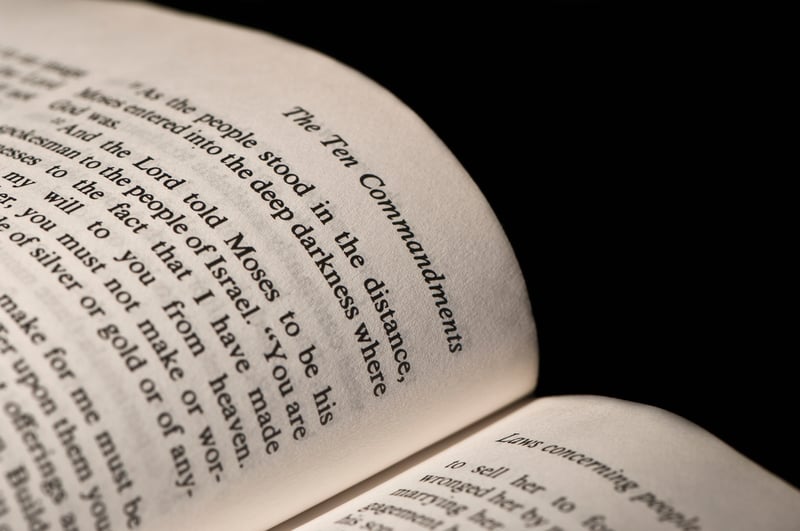How to Ask God for Forgiveness
We all need forgiveness, but how can we get it? What does the Bible say about asking God to forgive us? How should we do it? What steps can we take?

Jesus provided a model prayer, not as a chant to be recited mindlessly, but as a guide.
Christ tells us to pray to the Father, “Forgive us our debts” (Matthew 6:12). We should think soberly and intently about how we do that.
But how does one ask God for forgiveness? Is there a way one can be sure God will hear his or her prayers asking for forgiveness?
This blog post outlines four things we should do when we ask God for forgiveness.
1. View sin the way God does.
Many would have us believe that “sin” is an archaic concept invented years ago to intimidate and subjugate well-meaning people. But is sin really just a relic of the ancient past? Does it have any bearing on our modern and enlightened world today?
What is sin?
John provides a basic definition: “Sin is the transgression of the law” (1 John 3:4, King James Version). The law of God is summarized in the 10 Commandments.
When the law is obeyed, blessings abound. But when it is transgressed—intentionally or unintentionally—curses follow, which harm and wreak havoc on everyone involved. For a detailed list of the penalties of sin, read Deuteronomy 28:15-68.
The 10 Commandments define what sin is. To view sin as God sees it, we must understand His Commandments. 
Since no one is immune to sin’s pervasive influence, every human being has felt one of these curses to one degree or another (Romans 3:23). And just as you might ache at the thought of someone experiencing any of the incidents or conditions above, so does God—and doubly so, because He is our Father and Creator.
Genesis 6:6 reminds us that when God sees sin take its vicious toll on people’s lives, He is “grieved in His heart.”
Sin is awful in what it does to us and the people around us. More than that, sin is horrible because it required the life of the innocent Son of God. Jesus Christ was crucified to pay for our sins.
These facts should inform our view of the wretchedness of sin and why we need God's forgiveness to cover it.
2. Humble yourself before God and admit you were wrong.
One of the hardest things for a human being to do is to admit, “I was wrong.” Think about it. Conflicts of varying scales—from interpersonal to bloody wars—are sometimes fought over people’s refusal to accept that they were wrong.
Asking for forgiveness is no cinch for the same reason. It involves admitting that you were wrong—that you sinned.
What makes admitting wrong difficult and an increasingly scarce phenomenon in the world? It’s the result of our deeply ingrained pride. Pride is what makes someone arrogant and self-important. It’s what leads you to believe that you have done nothing wrong, have no one to answer to, and don’t have to ask for forgiveness. Pride represents the most dangerous threat to someone’s salvation.
The opposite of pride is humility. This is what God wants.
Humility is the antidote to pride. It comes from recognizing our fallibility, weaknesses and reliance on God. When we approach God with humility, He is eager to hear and answer our prayers.
Humility is the antidote to pride. It comes from recognizing our fallibility, weaknesses and reliance on God. When we approach God with humility, He is eager to hear and answer our prayers.
Notice what the apostle Peter wrote: “Be clothed with humility, for ‘God resists the proud, but gives grace to the humble’” (1 Peter 5:5, emphasis added throughout).
Consider King Manasseh’s story. He was an extremely wicked king who led Judah for 55 years (2 Chronicles 33:1-2). He plunged the nation into moral depravity and set the people on a deviant course that they never fully recovered from (Jeremiah 15:4). Because of his sins, God allowed Manasseh to be taken in chains to Babylon.
While in captivity, Manasseh began to see who he was and what he had done. He came to grips with the reality of his self-caused punishment. He held himself totally accountable for his actions and threw himself on the mercy of God. The Bible says this: “Now when he was in affliction, he implored the LORD his God, and humbled himself greatly before the God of his fathers, and prayed to Him” (2 Chronicles 33:12-13).
Not “begrudgingly” or “half-heartedly,” but Manasseh greatly humbled himself.
Notice the result: “He prayed to him, and God was moved by his entreaty and heard his plea and brought him again to Jerusalem into his kingdom” (verse 13, English Standard Version).
His story wouldn’t have ended as it did had he just stiffened his neck instead.
God heard his prayer because of his humility.
Pride and humility are disparate attitudes: one leads to death and the other to life.
3. Confess your sins to God in prayer.
The idea of confessing is nothing new. A defendant may confess a crime to a judge; a child may confess a lie to his or her parents; a spouse may confess an adulterous affair.
Whenever people own up to a wrongdoing or a mistake, we say they confessed.
But if a confession stops at admitting fault, it is not going far enough—especially if the motivation is wrong. For example, many people “confess” to themselves or others simply because secular experts tell them that doing so will release pent-up emotions and improve their overall health. They confess because they selfishly want a benefit, but have little regard for anything other than what an act of confession can do for them.
God wants us to confess our sins out of a genuine desire to mend the damage we have created in our relationship with Him. He wants a confession with depth.
This kind of motivation is self-seeking.
We need to be on guard against that. If we confess only because we want to ease the burden of guilt and feel slightly better, then we are in grave spiritual danger. God won’t grant forgiveness to anyone with that motivation.
Does God want us just to mouth some honest words about ourselves so we can avoid a psychological hindrance? No! He wants us to confess our sins out of a genuine desire to mend the damage we have created in our relationship with Him. He wants a confession with depth.
One proverb summarizes the kind of confession God honors: “He who covers his sins will not prosper, but whoever confesses and forsakes them will have mercy” (Proverbs 28:13).
“Confess and forsake” is what God is looking for in our prayers—this is what genuine repentance is all about. Admission of sin is just one part of repentance; the other part is a dogged determination to leave your sins behind and not repeat them.
Notice how King David embodied true confession when he prayed to God after his adultery with Bathsheba and murder of Uriah. “For I acknowledge my transgressions, and my sin is always before me,” he cried out. “Against You, You only, have I sinned, and done this evil in Your sight” (Psalm 51:3-4).
David was emotionally torn to shreds by what he did. But his prayer went further.
“Create in me a clean heart, O God, and renew a steadfast spirit within me,” he said (verse 10). In other words, I want a clean slate; I intend to change; I want to change; please help me change.
And did David hold to his word after this?
David’s entire life is summarized in 1 Kings 15:5: “David did what was right in the eyes of the LORD, and had not turned aside from anything that He commanded him all the days of his life, except in the matter of Uriah the Hittite.”
What a glowing comment attesting to the depth of David’s confession. We have no biblical record of David relapsing and returning to the sin he repented of. In every way, David confessed and forsook. God wants each of us to do the same.
For more insight, read “What Does It Mean to Confess Your Sins?”
4. Trust in God’s mercy and forgiveness.
Since God is the great Lawgiver, He alone can pardon us when we sin. He is the One with the ability to blot out our sins. Let this sink in: No one else in the universe—no one except God—can grant forgiveness. We can receive forgiveness only through the shed blood of Jesus Christ, who was God in the flesh.
Yes, God is the supreme Judge of justice—but mercy is one of His attributes as well. He is both fair and forgiving.
For our comfort and inspiration, God inspired the Bible to be replete with statements about His compassion. David reminds us, “For as the heavens are high above the earth, so great is His mercy toward those who fear Him” (Psalm 103:11).
He says again a few verses later, “The mercy of the LORD is from everlasting to everlasting” (verse 17).
And James, the one who grew up alongside the Son of God, said of his older step-brother: “The Lord is very compassionate and merciful” (James 5:11).
May this blog post encourage you as you ask God for forgiveness in your life.
Date Posted: June 5, 2023



